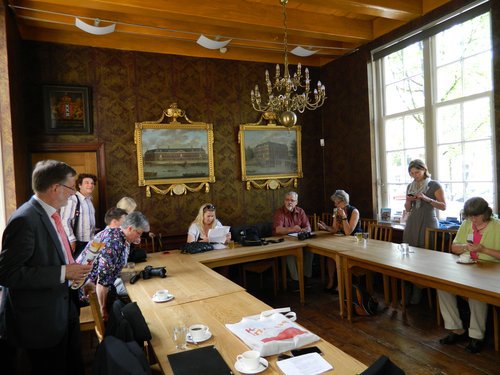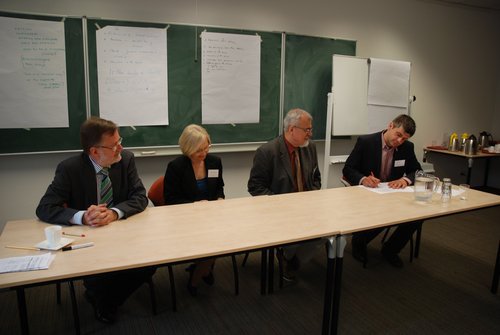In a secularized European society, reaching out and making meaningful contact with society is one of the Church’s most difficult challenges and one of its greatest concerns.
The Reformed Church in Hungary (RCH), represented by an eight-member delegation, and two of its partner churches, the Protestant Church in the Netherlands (PKN) and the Evangelical Church of Czech Brethren (ECCB), met in Utrecht on 21-23 May to lay the groundwork for a three-year project within the framework of the European Region of the World Communion of Reformed Churches and in cooperation with the Reformed Mission Alliance.

The undertaking is focused on searching for new forms of mission in secularized environments and will involve mutual church visits from the Czech, Hungarian and Dutch Churches from April 2014 to the spring of 2016. Joel Ruml and Lia Valkova, Synodal Senior and Synodal Curator of ECCB, Balázs Ódor, RCH ecumenical officer, and Dr. Arjan Plaisier, general secretary of PCN, signed the memorandum that lays out the specifics of the project.
The trip to Amsterdam doubled as the first meeting of the tri-Church partnership, which began in the form of a two-day conference known as “Learning as we go,” where discussions were organized with a focus on the practical exchange of views for wider ecumenical cooperation. The concept behind “Learning as we go” is to use the results and conversations from the previous meeting at the next meeting. In working groups and plenary meetings, the participants shared ideas about the process over the next two years and the three churches also agreed that the traditional parochial system is not able to maintain the mission service of the Church in big cities. A challenge that came from this: how can new forms of congregations inspire traditional congregations?

According to Ádám Hámori a sociologist at Károli Gáspár University and a member of the RCH delegation, the worldwide problem is modernization and the question is whether modernization equals the end of traditional churches, and as globalization grows in Europe, is the importance of Christianity decreasing? In his opinion, the real mission is to discover the true Christian identity and find new ways to address modern society. More and more people live out their faith without becoming a member of a congregation. The Church has to find modern ways to address these people and leave the traditional ways and systems behind.
How Churches do this is yet to be seen, but for the RCH, PCN and ECCB the trilateral partnership laid out in the Netherlands is the first step in defining new forms of mission needed to connect with the secularized societies in which they live. At the end of the three years project, the group will summarize and share the results with the European member churches of WCRC.
Amy Lester